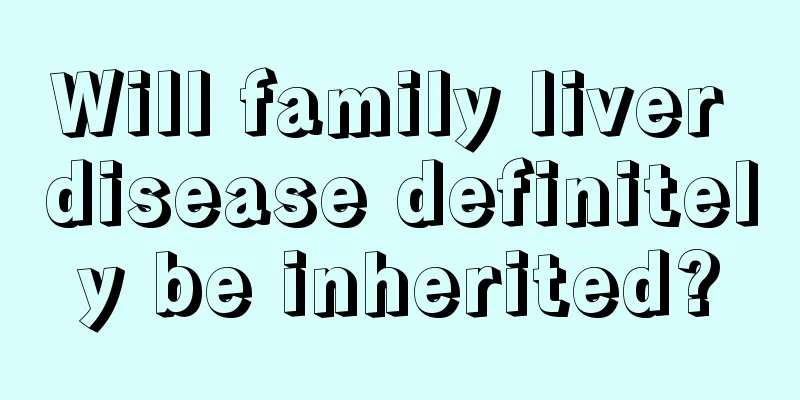Will family liver disease definitely be inherited?

|
Liver disease is a disease that everyone is familiar with. It is contagious to a certain extent. In many families, every member suffers from hepatitis B. This is not because it is hereditary, but because hepatitis B is highly contagious and other people are unfortunately infected by hepatitis B patients. Hereditary liver diseases generally include chronic hepatitis and cirrhosis. This article introduces the relevant content about infectious liver disease and hereditary liver disease. Let’s take a look. Is liver disease hereditary? Hepatitis is a serious disease that can threaten the patient's life. If not treated in time, it can develop into liver cancer. Therefore, hepatitis patients must receive timely treatment, and everyone should also pay attention to protective work in daily life. The occurrence of liver disease has a "family clustering phenomenon", and in fact there are many types of liver disease. Many people know that some hepatitis can be contagious, such as viral hepatitis. So is it possible that hepatitis can be passed on to the next generation? Let’s find out together. 1. There are many types of hepatitis. Generally speaking, there are two major categories. One is contagious and the other is hereditary. If it is hereditary hepatitis, it may be passed on to the next generation, so patients with this type of hepatitis should pay attention. 2. Hereditary hepatitis: that is, hereditary metabolic liver disease. This type of hepatitis disease can manifest as chronic hepatitis and cirrhosis, but there are very few cases of it actually developing into liver cancer. Common ones include: copper metabolism disease, iron metabolism disorder, carbohydrate metabolism disorder, lipid metabolism disorder, protein metabolism disorder and amino acid metabolism disease, etc. 3. Contagious hepatitis: All viral hepatitis are contagious, but the modes of transmission may vary slightly. The most common is hepatitis B, which tends to occur in families and is very harmful. In my country, most primary liver cancers are caused by hepatitis B virus or hepatitis C virus infection. Although hepatitis B and C are not hereditary diseases, they have a family clustering phenomenon because of their transmission routes. Since they can be transmitted from mother to child and through close contact within the family, it is easy to be infected with hepatitis B if you do not pay attention to prevention. |
<<: Are identical twins hereditary?
>>: Symptoms of hereditary heart disease
Recommend
How long can frozen meat be kept in the refrigerator
Nowadays, many people are busy at work, so they b...
Be more careful to prevent heat stroke in the beginning of autumn
Should we be more careful about preventing heatst...
Will chickenpox occur twice?
Even in modern society where modern medical techn...
Can meditation replace sleep?
Today's society is developing at a very fast ...
Is laryngeal cancer contagious?
In principle, laryngeal cancer is not contagious,...
What is the reason why the refrigerator smells so bad?
Refrigerators are commonly used household applian...
The refrigerator freezer is frozen
Refrigerators are common electrical appliances in...
Can I drink coffee after getting a face-lift injection
In our lives, many people are not satisfied with ...
How to remove keloid scars on the chest?
Keloid is a relatively common skin disease caused...
How to treat symptoms of muscle strain?
Many people move heavy objects for a long time an...
What are the benefits of abdominal breathing?
Abdominal breathing is one of the most popular he...
Aortic sclerosis, it is easy to rely on these people
Arteriosclerosis is most common among middle-aged...
Should I use hot or cold water to apply to swollen eyes?
If your eyes are swollen, you must pay attention ...
How to remove the lump from the ear piercing
Girls all love beauty, and many girls will get th...
The body sends these 5 early signs of prostate cancer that cannot be ignored
Prostate cancer is a terrible malignant tumor. It...









